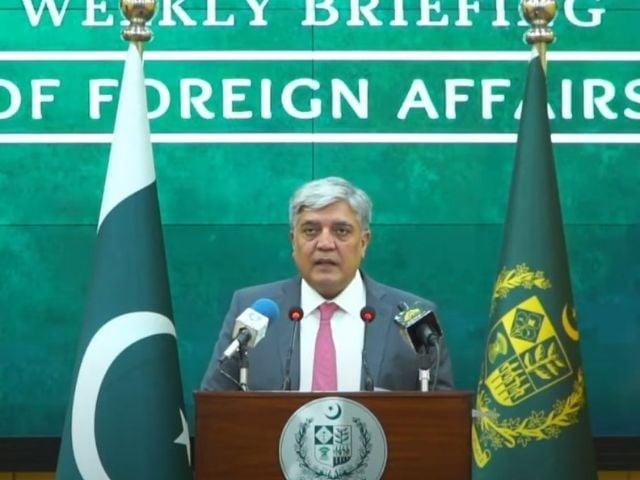Pakistan’s foreign office has rejected a bill introduced in the US Congress aimed at Pakistan, and called it an isolated act that does not represent the overall state of bilateral connections.
“We are aware of the bill introduced in the US Congress. It reflects a person’s opinion and not the broader US-Pakistan tapes,” spokesman for the Foreign Office Shafqat Ali Khan said during a weekly press briefing on Thursday.
He expressed hope that the US legislature would take steps to strengthen the links between the two countries despite the bill.
Khan also criticized the recent US sanctions against Pakistani commercial units and denoted them unilateral and without evidence.
In a comment on the question of Pakistani journalists who allegedly visiting Israel, Khan reiterated that Pakistani passport owners are legally excluded from traveling to Israel. “There has been no change in Pakistan’s policy,” he added, stating that such visits were made by double citizens.
On the Russia-Ukraine conflict, the spokesman welcomed the recent ceasefire agreement and expressed hope that it would lead to lasting peace.
He noted that Pakistan maintains good relations with both countries and consistently advocates of dialogue.
With regard to the recent diplomatic commitments, Khan said Sadiq Khan’s visit to Afghanistan included high -level discussions on cross -border issues, including rail links and border infrastructure.
In the past, two US lawmakers have introduced a Bipartisan bill in the House of Representatives seeking sanctions against Pakistani State Officers over alleged human rights violations, including “persecution” by former Prime Minister Imran Khan, according to US media.
The bill entitled The Pakistan Democracy Act was introduced by Republican Congress Member Joe Wilson of South Carolina and Democratic Congress Member Jimmy Panetta of California. It has been referred to the house’s foreign affairs and justice committees for review.
The proposed legislation requires sanctions to be imposed on Pakistan’s army chief within 180 days if the country does not take steps to improve its human rights situation.
The bill aims to invoke the US Global Magnitsky Human Rights Accountability Act, which allows the United States to refuse Visa and entry to people accused of committing human rights violations.
It also requires the US government to identify and sanctions individuals who are allegedly involved in the suppression of political opposition in Pakistan.
The president was given the authority to lift the sanctions if Pakistan finishes military interference with civilian governance and releases all “unlawfully withheld politically imprisoned.”



